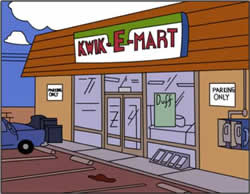Difference between Mall and Mart
Key Difference: Shopping malls or malls are large enclosed spaces that are often characterized with many stores that sell merchandise to the public. Malls can be medium to large in size, depending on the construction and the number of stores that it wants to hold. Mart is any place where people can come together for buying and selling. Mart is short for market.
Malls and marts are two terms that are often confusing for many people. Malls are huge building that house many stores and shops that are connected using walkways and bridges. The term mart can be used to refer to two things, one any place where buying or selling takes place, another a strip mall or an open-air mall.
 Shopping malls or malls are large enclosed spaces that are often characterized with many stores that sell merchandise to the public. These places are also referred to as shopping arcade or shopping precinct. Malls can be medium to large in size, depending on the construction and the number of stores that it wants to hold. Shopping centers usually refer to smaller malls, while shopping malls are used to refer to the large shopping areas. The malls are enclosed and have centralized cooling or heating, depending on the weather and the area where the mall is located. Malls are also car-friendly and are associated with having large parking spaces in an underground parking lot or an adjoining building. The malls also have many different stores that sell many different kinds of merchandise, including food, jewelry, clothes, specialized stores, watches, etc.
Shopping malls or malls are large enclosed spaces that are often characterized with many stores that sell merchandise to the public. These places are also referred to as shopping arcade or shopping precinct. Malls can be medium to large in size, depending on the construction and the number of stores that it wants to hold. Shopping centers usually refer to smaller malls, while shopping malls are used to refer to the large shopping areas. The malls are enclosed and have centralized cooling or heating, depending on the weather and the area where the mall is located. Malls are also car-friendly and are associated with having large parking spaces in an underground parking lot or an adjoining building. The malls also have many different stores that sell many different kinds of merchandise, including food, jewelry, clothes, specialized stores, watches, etc.
The concept of the mall has not been a new one; they have been around since Ancient Rome. The concept itself has been acquired from the Trajan's Market that was one of the earliest shopping centers that established in Rome. Rome’s are also known for its many bazaars, which eventually developed to shopping malls. The malls gained popularity around the 1920s, following World War II, when people started shifting to the suburbs from the city. In order to make it easier for the people to shop, many stores were opened in one bigger store that allowed easier access to the various stores in the same place.
The malls have a variety of branded and local based stores. The prices of the stores also vary depending on the type of the store; while branded stores are quite pricy; other smaller stores offer normal prices on merchandise. Malls are also associated with having food courts, movie theatres, play area and many other attractions to draw in the public. A few malls, such as the Mall of America in Bloomington, Minnesota, have also housed an amusement park inside to mall itself. Malls are quite large and require a lot of time to try and visit every store. They have elevators, escalators, stairs and walkways to help the public get around from one place to another. There are various different kinds of malls: Neighborhood center, Community center, Regional center, Superregional center, Fashion/specialty center, Power center, Theme/festival center and outlet center. Another feature of the mall is that they cannot conduct sales online, they must have a proper outlet; though they can have their own websites that state upcoming events, the number of stores or a list of the stores they have, etc.
 Marts are defined as any place where people can come together for buying and selling including malls, stores, supermarket, flee market, etc. The term ‘mart’ is an abbreviation for supermarket. Marts are commonly used to refer to a building where wholesalers selling goods and merchandise to retailers. Mart is not so different from mall, as mall can actually be termed as a mart. Modern usage of the term mart often defines strip malls where multiple stores are housed in a building but does not have a connected doorway. The people must exit one store completely, come outside and then enter another store.
Marts are defined as any place where people can come together for buying and selling including malls, stores, supermarket, flee market, etc. The term ‘mart’ is an abbreviation for supermarket. Marts are commonly used to refer to a building where wholesalers selling goods and merchandise to retailers. Mart is not so different from mall, as mall can actually be termed as a mart. Modern usage of the term mart often defines strip malls where multiple stores are housed in a building but does not have a connected doorway. The people must exit one store completely, come outside and then enter another store.
Dictionary.com defines ‘mart’ as:
- Market; trading center; trade center.
- A building, center, or exposition for the sale of goods by manufacturers and wholesalers to retail merchants.
- A fair.
Image Courtesy: prodryers.com, simpsons.wikia.com









Add new comment